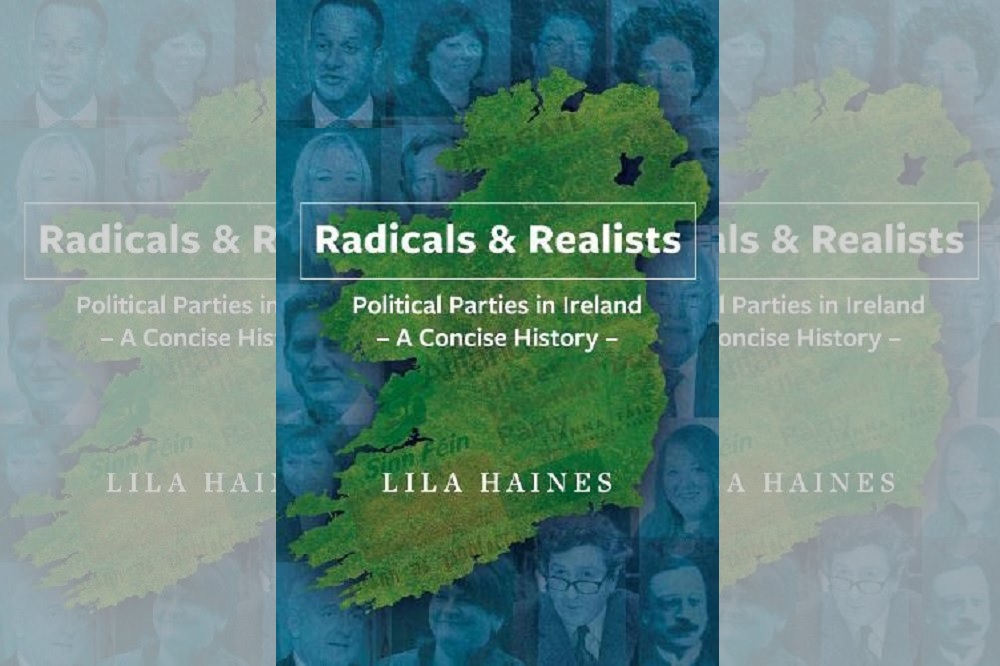Review: Radicals and Realists by Lila Haines

Jonathan Evershed
Welsh perceptions of Ireland tend to be framed by assertions about ‘ancient’ connections and pan-Celtic fellow-feeling.
Such assertions often belie, however, the reality of the history of relationships across the Irish Sea, which have been shaped as much by mutual antagonism as by fraternity.
Indeed, how much we in Wales really know, understand or even care about Ireland is, I think, unclear.
Since returning to live in Wales after the best part of a decade spent working in and on politics on the island of Ireland, I have found that awareness and understanding of Irish politics is often lacking in Wales, even where – including as a consequence of both Brexit and Covid – these politics have direct implications here.
This is not surprising when we live in a media environment in which much of the news and analysis we consume is strikingly Anglo-centric, and ignorant of what really goes on in Wales, let alone what happens across the water.
Lila Haines’ Radicals & Realists: Political Parties in Ireland, A Concise History offers a timely, accessible and ameliorative intervention here.
It treats the island of Ireland as a whole, and engages constructively and critically with politics North and South of the border, with Unionists, Nationalists and ‘Others’, and with the relationships between them.
Concise
Per its title, the book provides a concise history of the party system(s) on the island of Ireland, and charts the ebbs and flows in the fortunes of Ireland’s political parties.
It is comprised of twelve biographies of the parties that have played a significant role in Irish politics since the late nineteenth century.
As Haines herself admits, there are other parties who might have been profiled, but her decision as to which parties to include and which to omit is well-reasoned and, to my mind, justified.
These potted party histories are preceded by an introductory chapter which provides a user-friendly outline of wider Irish history and highlights key themes.
They are followed by a more speculative epilogue and some useful appendices, which includes a genealogy of Irish Nationalist parties.
Haines provides a lively introduction to the key personalities that have shaped twentieth and early twenty first century Irish politics, and the parties over which they presided.
She highlights some of the key dilemmas (some of them self-inflicted) that these parties and their leaders were confronted with, how these dilemmas were dealt with, and with what political consequences.
Conflict
Haines is balanced, informative and critical in her appraisal of all of the parties she profiles in the book, but there are nonetheless (inevitably, I would argue) some implicit political judgements that emerge throughout.
The chapter on Sinn Féin, for instance, places the blame for the Troubles on Irish Republicans in a way which, by my reading, downplays the role of the British state violence and other structural factors in shaping the conflict.
More generally, across the twelve chapters, the narrative that Haines constructs hinges around what she terms the transition from ‘radicalism’ to ‘realism’, and the value of what is termed ‘pragmatism’.
I might quibble with these terms, and the particular kinds of political values that they can act to reflect and reinforce.
Discourses about the contemporary ‘maturity’ of Irish politics can serve to reinforce the political status quo and represent it as inevitable rather than contingent.
Overall, the book tends more to description rather than explanation. In doing so, it draws on an impressive number of sources.
Some of these sources, such as Brendan O’Leary’s three volume Treatise on Northern Ireland are must-reads for those seeking a deeper understanding of Irish politics, North and South, and their entanglement with the history and legacies of British colonialism.
Others, such as Liam Kennedy’s Who Was Responsible for the Troubles?, are more polemical, and should, in my view, be approached with more caution.
Historical forces
There are a number of influential works of Irish history and some good political biographies listed in the book’s bibliography, but work from the social and political sciences – including, but not limited to, Tonge, Braniff, McAuley, Hennessy and Whiting’s books on the DUP and the UUP – are missing.
No doubt pressures of time and space were at work here, but it also demonstrates a wider tendency to view Irish politics as a product of historical, rather than contemporary social and economic forces.
These criticisms notwithstanding, Radicals and Realists is a concise and well-written introduction to Irish political history. I share the author’s hope that it might thereby provide readers with an accessible gateway to deeper critical exploration of contemporary Irish politics.
Bilateral engagement
Since 2021, the Ireland-Wales Shared Statement and Joint Action Plan has framed a much-needed renewed process of bilateral engagement between the Welsh and Irish Governments.
The statement represents that the axis between Dublin and Cardiff has the potential to be as important for our post-Brexit political future as that between Cardiff and London.
As both Wales and Ireland contemplate their constitutional futures, it is becoming increasingly clear that these futures are inextricably intertwined. It behoves all of us, therefore, to engage more deliberately with the politics of our neighbouring island.
Haines’ book is a useful starting point.
Radicals and Realists: Political Parties in Ireland – A Concise History by Lila Haines is published by Welsh Academic Press. It is available from all good bookshops or you can by a copy here.
Support our Nation today
For the price of a cup of coffee a month you can help us create an independent, not-for-profit, national news service for the people of Wales, by the people of Wales.






